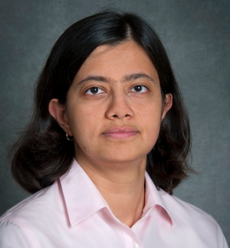Women's History Month, 2017: Lavanya Ramakrishnan
March 24, 2017
« Back to Overview |
Leen Alawieh » |
Sowmya Balasubramanian » |
Deborah Bard » |
Tina Declerck » |
Mariam Kiran » |
Lavanya Ramakrishnan » |
Jackie Scoggins » |
Francesca Verdier » |
Lavanya Ramakrishnan first came to Berkeley Lab in 2009 as an Alvarez Fellow and today is a staff scientist in CRD’s Data Science and Technology department. She previously worked as a research staff member at Renaissance Computing Institute and MCNC in North Carolina. She has a M.S. and a Ph.D. in Computer Science from Indiana University and a bachelor degree in computer engineering from VJTI, University of Mumbai.
What drew you to working in CRD?
I am passionate about enabling the sciences, and CRD's interdisciplinary projects were a major attraction.
What are some of your proudest achievements?
I started on the lab’s Magellan cloud computing project, a very comprehensive study evaluating clouds for science. Subsequently, the Google-funded project CLEER model has been widely used. More recently, we have been doing a lot in user research where we are using a mix of methodologies from social sciences and human computer interaction to complement our technical contributions in a number of projects. This has resulted in deep insights of user requirements that has improved not just usability but also improved the design of the overall tools and technologies. While we are using these techniques in a number of DST projects, the UDA (Usable Data Abstractions for next-generation scientific workflows) project gives us a strong foundational work in ethnography and user research.
What is your favorite thing about working in CRD or at the lab in general?
Hard to pick one favorite thing! Open, collaborative, flexible, diverse environment.
What are some of the challenges you have faced being a woman in what has traditionally been a male-dominated field?
Overall at the lab I have gotten a lot of support and encouragement from management and peers. That is actually one of the other great things about the lab. But as a woman in computer science, we have all faced our fair share of not being treated an equal over the course of our career.
What lessons have you learned along the way that you would share with other women thinking about working in this field, or in a science/technology/engineering position in general?
Be yourself! I find there is a lot of focus on women feeling like they need to act like a man. But I have found my strengths at work are different from men and it helps my team and my organization. Also, don't be afraid to speak up. Early in my career I wasn't sure how to handle difficult situations. But I have now had situations where I have called out men who said things that were discriminatory toward women and many times it had not even occurred to them till I pointed it out. Many of these folks are more aware and focus now on building diverse environments. I have also used humor effectively in difficult situations to point out people's biases.
Do you have a particular anecdote/story you'd like to share?
After my daughter was born and I came back to work, the first question many people asked me was who was watching my daughter while I came to work. Overall it was a well-meaning question. In fact, the lab was the best place for me to be at since people were very nice and accommodating as I juggled the pressures of my job with being a new mother. But the odd thing is not one person asked my husband the same question when he went back to work, even though most people knew we were both working. I think this is a good example of the inherent biases we have in our minds and society.
About Computing Sciences at Berkeley Lab
High performance computing plays a critical role in scientific discovery. Researchers increasingly rely on advances in computer science, mathematics, computational science, data science, and large-scale computing and networking to increase our understanding of ourselves, our planet, and our universe. Berkeley Lab’s Computing Sciences Area researches, develops, and deploys new foundations, tools, and technologies to meet these needs and to advance research across a broad range of scientific disciplines.







 Instagram
Instagram YouTube
YouTube